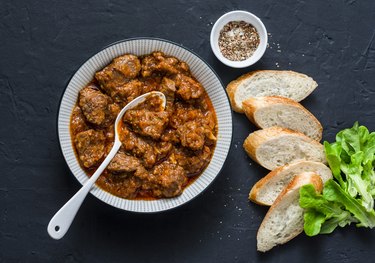
Has this ever happened to you? You're making a nice slow cooker beef stew, you put all the ingredients into the cooker, go to work and come home all excited about your meal, only to find that it's overcooked because you left the roast in the Crock-Pot on the high setting.
Here are some tips you can follow so that your slow cooker beef stew — or whichever meat dish you attempt — doesn't get sabotaged the next time around.
Video of the Day
Video of the Day
Understanding How Slow Cooking Works
The USDA Food Safety and Inspection Service explains that slow cookers operate at very low temperatures, cooking food over hours at temperatures between 170 and 280 degrees Fahrenheit, depending on whether you leave the roast in the Crock-Pot on the high setting or the low setting. The combination of trapped steam and direct heat helps tenderize the meat; in fact, even leaner cuts of meat can be tenderized in the slow cooker.
It seems almost impossible that meat could get overcooked at such low temperatures, but while it is unlikely, it is still possible. The University of Wisconsin Extension notes that the liquid in the slow cooker cannot boil away, as it does when you cook on the stove or in the oven, so while the meat won't necessarily burn, it can get overcooked.
According to the University of Wyoming Extension, slow cooking requires some balancing, because moist heat melts the collagen in the meat, making it more tender, but it also causes the muscle fibers in the meat to shrink and get tougher. The hotter the temperature, the tougher the meat.
Figuring out the right temperature, duration and amount of liquid is important, because you want to make sure the meat gets cooked and all the germs get killed, but you don't want the meat to get tough, or worse, mushy.
Preventing Overcooked Slow Cooker Recipes
Most slow cooker recipes specify details like how much water to add to the cooker, what setting to leave it on and how long you should let it cook. You should probably follow the recipe exactly the first few times before you start to make any adjustments.
Read more: Crock Pot Beef Shank and Black Bean Chili
If you do make adjustments, the University of Wyoming Extension recommends keeping in mind that two hours on the low setting is equal to one hour on the high setting. So, if your recipe is intended to be cooked on the low setting but you want to cook the roast in the Crock-Pot on the high setting, remember to halve the cooking time.
How much you fill the slow cooker is also important; the University of Wyoming Extension states that it should not be less than half full, but it should not be more than two-thirds either. If the cooker is not full enough, the meat could cook faster and get overcooked; however, if the cooker is too full, the liquid could spill over and make a mess.
Read more: Japanese Beef Curry
The University of Wyoming Extension also suggests adding the ingredients into the slow cooker in a particular order. Start with the veggies, placing them on the bottom and on the sides. Then add the meat, and pour the liquid on top. For your slow cooker beef stew recipe, for example, you should start with the veggies, then add the beef and top it up with the beef broth and sauces.
Slow cooker recipes also sometimes require you to brown the meat first. This is an extra step and may take a few minutes longer, but it can help ensure that the meat retains its moisture in the slow cooker and doesn't get too tough.
Read more: Healthy Crock Pot Roast